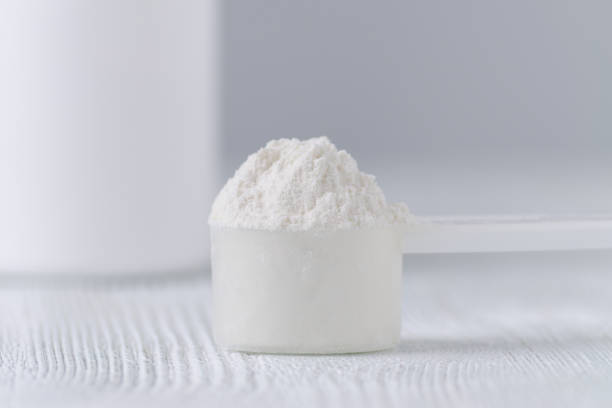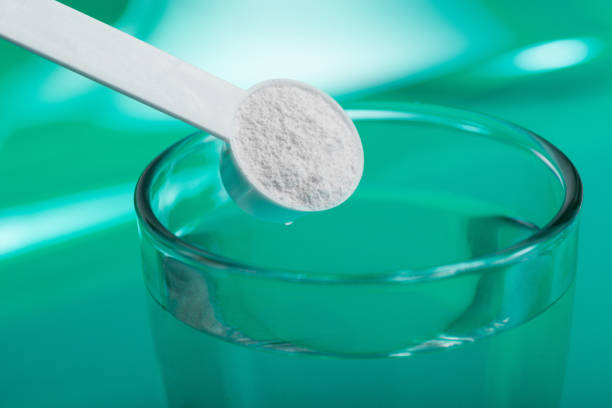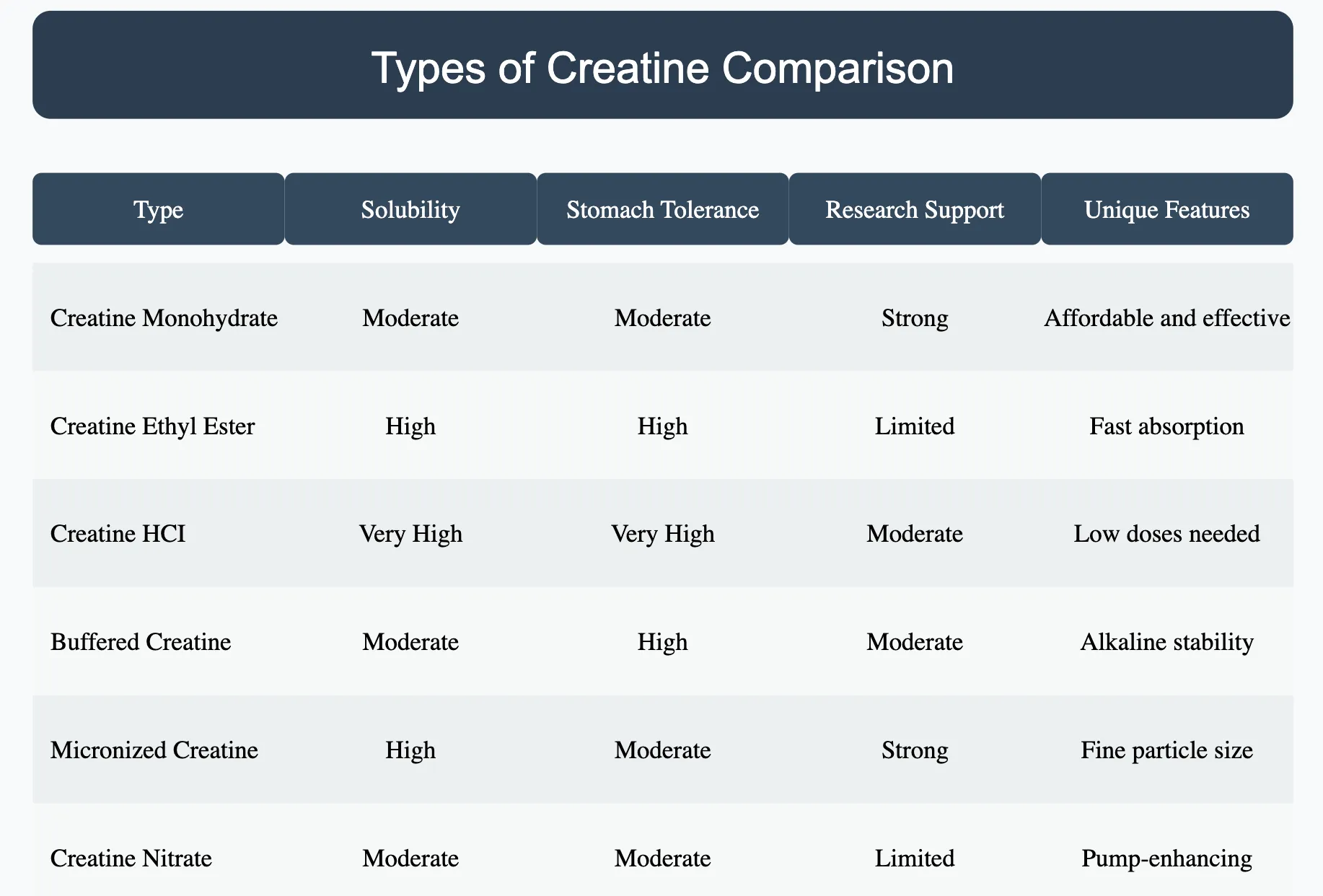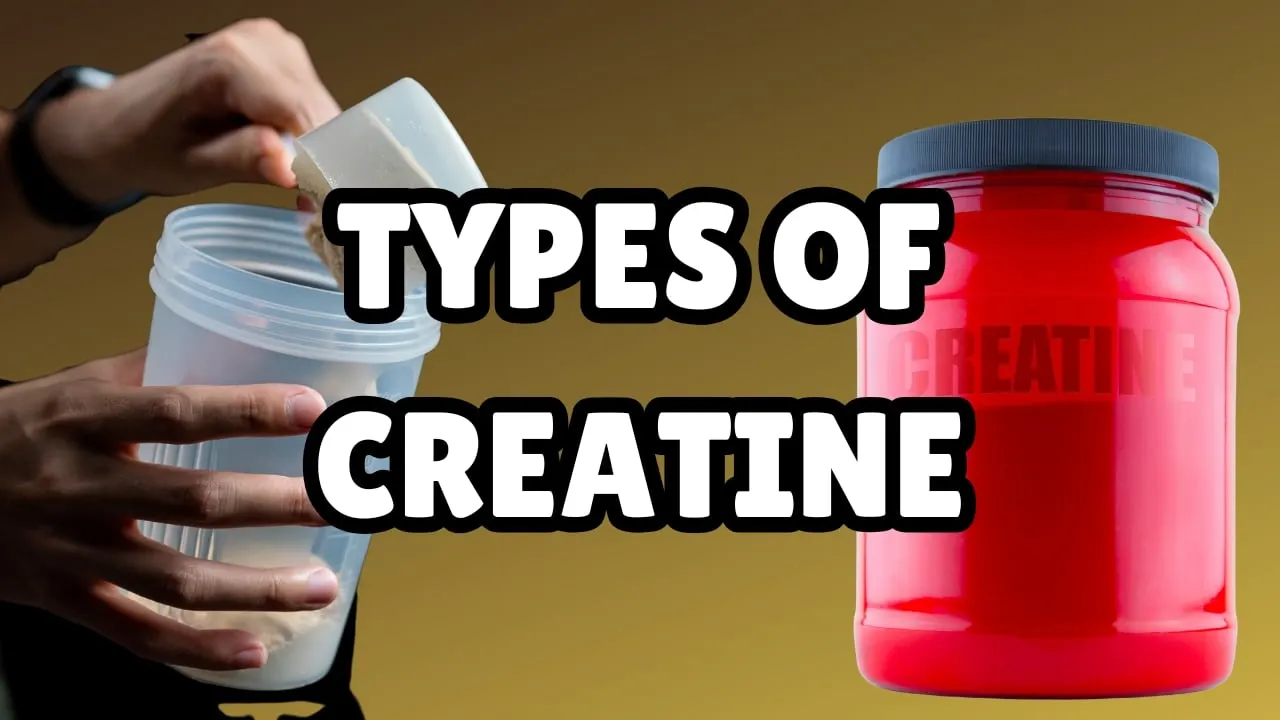Choosing the Right Type of Creatine: A Guide to Supplement Forms
Understanding the Different Types of Creatine Supplements
Creatine is one of the most researched and widely used dietary supplements. With various forms of creatine available, it can be hard to decide which type of creatine fits your goals best.
This article will explain the different types of creatine supplements, their unique features, and how they work, so you can make an informed choice.

Outline
- What Are the Different Types of Creatine?
- Creatine Monohydrate: The Gold Standard
- Creatine Ethyl Ester: Faster Absorption?
- Creatine Hydrochloride (HCl): Easier on the Stomach
- Buffered Creatine: Stability in the Stomach
- Liquid Creatine: Convenience at a Cost
- Creatine Magnesium Chelate: Improved Energy Transfer
- Micronized Creatine: Enhanced Solubility
- Creatine Nitrate: Added Pump Potential
- Comparing Popular Types of Creatine
- Misconceptions About Creatine Supplementation
- Choosing the Right Form of Creatine for Your Goals
1. What Are the Different Types of Creatine?
There are many forms of creatine on the market. Each type of creatine claims to have unique benefits, such as better absorption or reduced side effects.
Some types include creatine monohydrate, creatine ethyl ester, creatine hydrochloride, and buffered creatine.
2. Creatine Monohydrate: The Gold Standard
Creatine monohydrate is the most studied and widely used form of creatine. It consists of a creatine molecule bound to a water molecule.
This form is:
- Highly effective at increasing muscle creatine levels.
- Affordable and widely available.
- Shown to improve muscle mass and strength in countless studies.
Learn more about creatine monohydrate gummies and their benefits.
Micronized creatine, a version of creatine monohydrate, has smaller particles, improving solubility and reducing stomach discomfort.
3. Creatine Ethyl Ester: Faster Absorption?
Creatine ethyl ester is a form of creatine bound to an ester molecule. This modification aims to improve absorption and reduce bloating.
However, studies suggest that creatine ethyl ester supplementation may not promote greater changes in muscle creatine content compared to creatine monohydrate.

4. Creatine Hydrochloride (HCl): Easier on the Stomach
Creatine HCl is made by binding creatine to a hydrochloride group.
This form:
- Is more water-soluble than creatine monohydrate.
- May cause fewer digestive issues.
- Requires smaller doses due to its high potency.
To dive deeper, check out our article on creatine HCl vs. monohydrate.
5. Buffered Creatine: Stability in the Stomach
Buffered creatine contains an alkaline agent to improve stability in the stomach.
However, studies show that buffered creatine does not outperform regular creatine monohydrate.
6. Liquid Creatine: Convenience at a Cost
Liquid creatine is creatine dissolved in a liquid solution.
While it offers convenience, it often degrades before consumption, making it less effective than creatine powder.

7. Creatine Magnesium Chelate: Improved Energy Transfer
This form combines creatine with magnesium, which aims to enhance energy transfer during exercise.
Learn about creatine’s role in performance and recovery.
8. Micronized Creatine: Enhanced Solubility
Micronized creatine is a finer version of creatine monohydrate, improving solubility and reducing grit. Explore micronized creatine's unique features.

9. Creatine Nitrate: Added Pump Potential
Creatine nitrate combines creatine with a nitrate group, aiming to enhance nitric oxide production for better blood flow.
Learn about creatine's impact on pump and performance.
10. Comparing Popular Types of Creatine
This table highlights the differences between popular forms of creatine. For more details, explore our ultimate guide.

11. Misconceptions About Creatine Supplementation
Some misconceptions about creatine include:
- "Creatine is harmful to the kidneys." Studies show it's safe when taken as directed.
- "All forms are equally effective." Learn the truth about creatine myths.
12. Choosing the Right Form of Creatine for Your Goals
When choosing a form of creatine, consider your goals. Learn more in our guide on choosing the right creatine.
Key Takeaways
- Creatine monohydrate is the gold standard for effectiveness and affordability.
- Misconceptions persist, but evidence supports creatine’s safety and efficacy.
- Explore our comprehensive guide for more information.

FAQ: Common Questions About Creatine
What is creatine, and how does it work?
Creatine is a naturally occurring compound found in the body and certain foods.
It plays a key role in energy production by converting to creatine phosphate, which helps regenerate ATP (adenosine triphosphate), the primary energy source for muscle contractions.
What are the benefits of creatine supplementation?
Creatine can help improve strength, muscle mass, and exercise performance. It is particularly effective during high-intensity, short-duration activities.
How should I take creatine for the best results?
Many people use a "loading phase," taking 20 grams of creatine monohydrate per day for 5-7 days, followed by a maintenance dose of 3-5 grams per day.
Alternatively, you can start with the maintenance dose without a loading phase.
Is creatine monohydrate better than other forms?
Creatine monohydrate is considered the gold standard due to its extensive research, affordability, and proven efficacy.
Other forms, like creatine ethyl ester and creatine HCl, may offer specific benefits but have not consistently shown superior results.
Can I get creatine from food?
Yes, creatine is found in foods like red meat and fish. However, the amount is relatively small, so supplementation is often necessary for noticeable performance improvements.
Are there side effects of creatine supplementation?
Creatine is generally safe for most people when taken as directed. Minor side effects like bloating or digestive discomfort can occur but are often reduced with micronized creatine or lower doses.
Does creatine supplementation improve recovery?
Yes, creatine supplementation may aid in recovery by reducing muscle damage and inflammation after intense workouts.
What is the timing of creatine supplementation?
Timing is flexible, but taking creatine after workouts with a carbohydrate source may enhance absorption.
Is creatine effective for vegetarians?
Yes, vegetarians often have lower baseline creatine levels, making them more responsive to supplementation.
What are alternative forms of creatine supplementation?
Alternative forms include creatine HCl, creatine ethyl ester, creatine magnesium chelate, and creatine nitrate.
These forms may vary in solubility, absorption, or specific benefits but are generally less supported by research compared to creatine monohydrate.

Final Thoughts
Creatine is a popular supplement that continues to dominate the fitness and wellness industry due to its wide-ranging benefits and well-documented safety profile. While novel forms of creatine, such as creatine ethyl ester and creatine serum, have emerged in recent years, it is essential to critically assess their efficacy.
For example, research indicates that creatine ethyl ester supplementation combined with exercise does not promote greater training adaptations than creatine monohydrate. Similarly, while creatine serum offers convenience, it has proven less effective than creatine monohydrate for improving serum and muscle creatine levels.
Among the many options, creatine monohydrate remains the gold standard for improving performance, recovery, and muscle strength. Studies have shown that creatine monohydrate supplementation consistently outperforms alternatives, including creatine hydrochloride, creatine anhydrous, and chelated forms like magnesium creatine. For those looking to optimize their creatine supplementation regimen, approaches like creatine loading and low-dose creatine protocols can improve exercise outcomes and ensure optimal levels of creatine in the body.
Questions and misconceptions about creatine persist, particularly regarding the safety and efficacy of creatine. However, the regulatory status of creatine and related supplements affirms its safe use when taken as directed. Whether you are exploring creatine for health and disease management or athletic performance, this sports supplement remains a cornerstone of effective supplementation in exercise and recovery.
Ultimately, while novel forms like creatine HCl and creatine ethyl ester are marketed as "better than creatine monohydrate," their claims often fall short under scientific scrutiny. For those considering supplementation, understanding the effects of long-term magnesium creatine chelate supplementation, short-term creatine use, and the interaction of creatine in the stomach is vital. Remember, choosing the right amount of creatine and timing your supplementation can enhance its benefits, whether you’re cycling, running, or looking to improve strength.
By making informed decisions, you can harness the proven power of creatine monohydrate for the improvement of performance, recovery, and overall health. As always, consult with a professional before adding any new supplement to your routine.
For More Training Advice + Diet and Lifestyle visit us Combat Creatine
PS: Make sure you check out the rest of our Creatine Guides:
Creatine
Creatine Supplements Ultimate Guide
Creatine Supplementation Side Effects
Best Creatine Monohydrate Gummies Review: Top 10 Best Creatine Gummies













